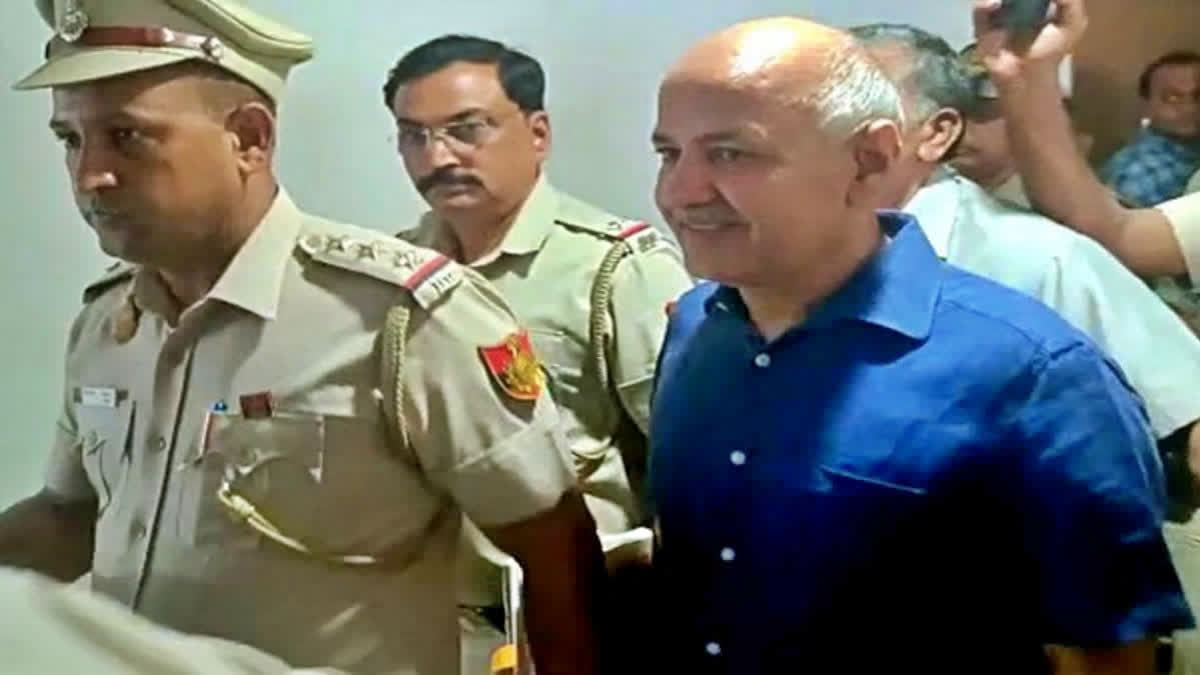New Delhi: The Supreme Court Thursday posed a series of tough questions to the investigating agencies while hearing the bail pleas of former Delhi deputy chief minister Manish Sisodia who is languishing in jail in the Delhi liquor policy case.
The apex court raised doubts about the strength of ED’s case in connection with the Prevention of Money Laundering Act (PMLA) and observed that the chain of evidence has not been fully established. The court was hearing two petitions filed by Sisodia challenging the decisions of the Delhi High Court, denying him bail in the cases being investigated by the CBI and the ED.
A bench comprising justices Sanjiv Khanna and SVN Bhatti asked additional solicitor general S V Raju, representing the Enforcement Directorate and CBI, to bring on record the proof against Sisodia, except for the statement of businessman Dinesh Arora, who is an accused in the case himself.
The bench asked whether a policy decision could be legally challenged in the manner presented. The CBI had argued that the policy was deliberately designed to favour specific individuals and described incriminating WhatsApp messages as evidence. However, the bench expressed reservations about the admissibility of these messages.
The bench asked Raju: "Have you seen them (Vijay Nair, Manish Sisodia on bribes) discussing this? Will it be admissible? Isn't the statement (by an approver) hearsay?" The bench said it is an inference but has to be based on evidence and in the cross-examination, this will fall flat in two minutes. The ED had claimed that AAP used Rs 100 crore received as kickback from various stakeholders for its campaign in the 2022 Goa assembly elections
The bench asked Raju, "Where is the proof? Where is the evidence? You have to establish a chain. The money has to flow from the liquor lobby to the person... Where are the proceeds of the crime?” The bench observed that Sisodia didn't appear to be involved in conversations of the 'south group', and further queried agencies how he was made an accused in a money laundering case.
The bench said, "Manish Sisodia does not seem to be involved. Vijay Nair is there but not Manish Sisodia. How will you bring him under the money-laundering act?" The bench noted that the agencies' case is that money had been received by Manish Sisodia. "How did it reach him from the so-called liquor group?" the bench asked.
It noted that the agencies have taken two figures, Rs 100 crore and Rs 30 crore and asked: "Who paid them this? There can be so many people paying the money -- not necessarily connected to liquor." The bench asked if Dinesh Arora himself was the recipient and except for Arora's statement, is there was any other evidence.
"Where is the liquor group based – Karnataka or Andhra Pradesh?" the bench asked Raju who said they are based in Telangana. Justice Khanna asked why they went to some other place for the money. Justice Khanna said, “You have to establish the chain….this doesn’t fully establish.” Raju insisted that it was established.
Justice Khanna said, “You see money has to flow from the liquor lobby to the person and I agree with you both of us agree with you that is very difficult to establish the chain because everything is done under cover….correct in external account….but that is where you competence will come…” Raju said “money has originated from Abhishek Boinpally, that is Rs 12 crores….then Kavitha Magunta, Raghav Magunta, Sarath Reddy in the second place, and in the third place Boinpally, this is where the money has originated”.
Justice Khanna, how do we get that? Raju said, "We have the statements, and every person in the chain is corroborating this". Justice Khanna asked, “Who corroborates that the money was paid by the liquor group, now Dinesh Arora has become your approver that is why you made him your approver…..Gautam Mootha has become your approver now”. Raju said Mootha is not their approver.
Justice Khanna asked Raju: “How will you bring Sisodia under the Prevention of Money Laundering Act?...the money trail either comes to his pocket, if it goes to somebody else’s pocket then how will you, and in case it is a company then we have the vicarious liability principle.”
He added, “Money laundering is a separate offence for which a person has possession, for or five requirements are there, how will you establish in Manish Sisodia’s case that? It is a legal and factual argument”.
Regarding money paid by the liquor lobby in Goa, Justice Khanna queried Raju if Sisodia got the possession or if somebody else did. The bench noted that when someone gives a bribe, that person is involved in the activity, and is connected to the proceeds of crime. "Let's assume, ultimately no money is passed on, will PMLA trigger? What triggers in PMLA is proceeds of crime?" Justice Khanna observed.
He said that PMLA will be triggered after the proceeds of the crime are given or paid, and told Raju, "You have to connect the person concerned with the proceeds of crimes, directly or indirectly." Raju stressed that Sisodia was instrumental in the generation and should have put his foot down and not allowed the policy.
The hearing in the matter will continue next Wednesday.
Also read: Manish Sisodia bail plea: Why AAP not made accused in money laundering case, SC asks ED



